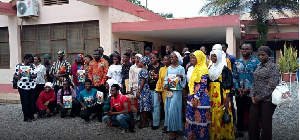 Participants of the dialogue in a group photo
Participants of the dialogue in a group photo
The Wa Municipal Voices of Youth Coalition (VoYC), a coalition of youth groups and advocates under the YOTA-initiated Youth on Board (YoB) project, held a youth dialogue to disseminate and discuss the findings of the 2024 Ghana Youth Barometer report on the perceptions of young people about education and their future.
The Youth Opportunity and Transformation in Africa (YOTA) initiated the YoB to amplify youth voices in advocating for increased attention and investment in Ghana's education sector, addressing critical issues of access and quality of education, particularly following the ravages of the COVID-19 pandemic.
The Youth Barometer report, part of the YoB project, documents the "perceptions of young Ghanaians regarding their education and the level of preparedness and confidence they have about their future."
The dialogue, held on Tuesday, October 1, 2024, in Wa, featured a presentation of the report findings, a panel discussion, and interactive sessions with key stakeholders and several young people in attendance.
In her welcome remarks, the President of the VoYC, Ms. Rahinatu Haruna, emphasized the urgent need for education reform to meet the diverse needs of all young people, "whether they reside in urban centers or rural communities, whether they are boys or girls."
She said VoYC has, for the past two years, been advocating for the re-enrollment of teenage mothers in basic schools to ensure every young girl has a second chance at education and an opportunity to reach her full potential.
Presenting the findings of the study, Hamid Alhassan Sokun, a youth researcher and member of the VoYC, indicated that the study sampled young people aged 15 to 35 across the 16 administrative regions of Ghana, with a sample size of 1,940 participants, comprising 1,122 urban and 818 rural youth, and 970 males and females each.
According to the study, the majority of young Ghanaians (42.9 percent) held the view that the education system in Ghana was retrogressing, while another section (27.5 percent) said it was stagnating. For some (24.8 percent), the education system was progressing.
The latter, as the study revealed, attributed the progressing status to factors such as increasing access to education and improvements in infrastructure, while the former attributed the retrogression and stagnation to the education curriculum being too theoretical and often lacking a connection between learned theories and their practical application in life.
Meanwhile, the study indicated that "a greater proportion of young people agreed (40.5 percent) and strongly agreed (12 percent) that the education system has adequately prepared them for working life in the future."
Regarding the employment aspirations of the youth, the report revealed that a vast majority of the youth (67.5 percent) preferred to venture into self-employment, followed by public sector (48.6 percent) and private sector (35.5 percent) employment preferences.
However, the youth identified a lack of adequate skills and education (62.5 percent), lack of connections or acquaintances (41.2 percent), and frequent illnesses (35.2 percent) as the top barriers to realizing their employment aspirations.
The Upper West Regional Coordinator of the Northern Development Authority (NDA), Madam Maria Johana Yuorpor, urged the youth to sharpen their skills and stand out to be noticed by their potential employers.
"You should stand out for your employer to find you, not that you will go looking for your employer," she said during the panel discussion session.
She said there were opportunities that the youth can harness if they come out of their shells, hone their skills, develop confidence, and make themselves stand out.
Madam Saudatu Mohammed, the Executive Director of Life Again, called for close collaboration among all actors in the education sector, including young people, to deliver a very responsive education system for national development.
Lawyer Dawdi Mohammed Giyas, a lecturer at the SDD University of Business and Integrated Development Studies, also urged for a change of mindset among the Ghanaian youth towards education, citing the notion that "any tertiary education less than a mainstream university is for people with weak passes."
The Youth on Board project is implemented by YOTA in partnership with 100% for the Children, with support from the Danish Civil Society in Development (CISU).
Feel free to let me know if you need any further adjustments!